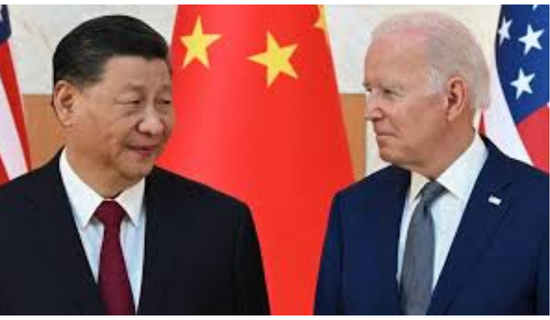United States President Joe Biden and Chinese President Xi Jinping held their final meeting on Saturday, a day after both leaders warned of turbulent times ahead with Donald Trump’s return to the White House.
Both leaders arrived on Saturday morning for the second and final day of the Asia-Pacific Economic Cooperation summit in Peru. The summit was overshadowed by the prospect of renewed trade wars and diplomatic upheaval as Trump prepares to begin his second term, according to AFP.
The encounter is expected to be their last before Trump’s anticipated return to power, which has cast uncertainty over the future of US-China relations.
The White House stated that Saturday’s meeting between Xi and Biden held on the sidelines of the APEC summit, would focus on a “delicate period of transition” and on ensuring that competition between the US and China “doesn’t veer into conflict.”
Ahead of their face-to-face meeting, scheduled for 4:00 pm (2100 GMT), Biden and Xi participated in a closed-door retreat with other leaders from countries including Canada, Chile, Singapore, Australia, Malaysia, and Japan.
The APEC summit, attended by leaders from 21 countries, was dominated by discussions on trade tensions and the potential diplomatic upheaval associated with Trump’s return to power.
Trump’s resurgent “America First” agenda and confrontational stance towards China have raised fears of a revival of trade wars and strained alliances.
Biden and Xi’s meeting sought to address what the White House described as a “delicate period of transition,” focusing on preventing the US-China rivalry from escalating into open conflict. This was the third meeting between the two leaders since Biden assumed office, with both working to stabilise relations amid global tensions.
In a written speech to the APEC forum, Xi warned of increasing “unilateralism and protectionism,” expressing China’s concerns over a possible shift in US policy under Trump.
Biden, speaking at the summit, highlighted the world’s current “moment of significant political change,” underscoring the challenges of navigating a tense geopolitical landscape.
He stressed the importance of strong US ties with allies, particularly in countering North Korea’s “dangerous and destabilising cooperation with Russia” as Pyongyang continues to send troops to fight in Ukraine.
Trump’s electoral victory over Democrat Kamala Harris has sent shockwaves through international markets and diplomatic circles. The Republican leader has signalled a hardline approach towards Beijing, threatening tariffs of up to 60% on Chinese imports to address trade imbalances.
Trump’s expected appointments of prominent China hawks, such as Marco Rubio, to key positions further indicate a tougher stance.
The implications of Trump’s return extend beyond trade. Biden’s efforts to reinforce alliances with Japan, South Korea, and other key partners face potential setbacks under a Trump presidency. At the summit, Biden emphasised the importance of these alliances in addressing shared security concerns, including North Korea’s collaboration with Russia in the Ukraine conflict.
Discussions between Biden and Xi also touched on sensitive issues, such as Taiwan and the South China Sea, where tensions have escalated due to China’s military posturing.
Both leaders agreed on the need to keep communication channels open, particularly military hotlines, to reduce the risk of miscalculations.
